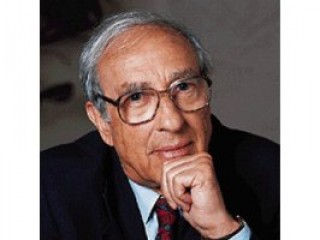
Edmond H. Fischer biography
Date of birth : 1920-04-06
Date of death : -
Birthplace : Shanghai, China
Nationality : American
Category : Science and Technology
Last modified : 2011-09-21
Credited as : biochemist, Nobel Prize for Physiology or Medicine, cell proteins
0 votes so far
Born in China, raised in Switzerland, the American biochemist Edmond H. Fischer deciphered and described reversible protein phosphorylation, the biological and chemical reaction that controls the activities of cell proteins. In the simplest terms, his work shows how life exists at the cellular level. Fischer worked at the University of Washington, collaborating for over 40 years with Edwin G. Krebs, and they were awarded the Nobel Prize together in 1992.
The son of Swiss parents, Fischer earned a Ph.D. in chemistry from the University of Geneva in 1947 and conducted research there until 1953. That year he went to the United States, where he joined Krebs on the faculty of the University of Washington, Seattle. He became a full professor there in 1961.
Fischer and Krebs made their discoveries in the mid-1950s while studying reversible phosphorylation-i.e., the attachment or detachment of phosphate groups to cell proteins. The two men were the first to purify and characterize one of the enzymes (phosphorylase) involved in the process of phosphorylation. They also discovered the enzymes that catalyze the attachment and detachment of phosphate groups, known as protein kinases and phosphatase, respectively. In the decades following these initial discoveries, scientists were able to identify many other enzymes that regulate specific processes in cells, leading to explanations of the mechanisms controlling basic activities in all living cells.
Awards:
Nobel Prize for Medicine 1992 (with Edwin G. Krebs)
American Academy of Arts and Sciences
Muscular Dystrophy Association Funding
National Academy of Sciences
National Science Foundation Board of Directors
Rockefeller Foundation Fellowship
















